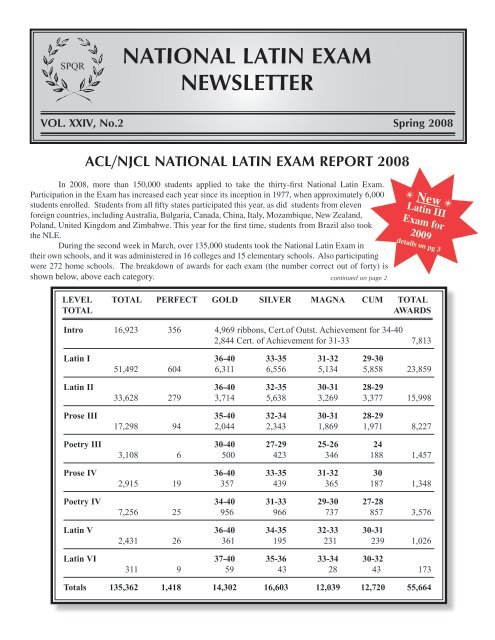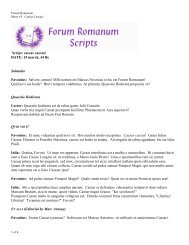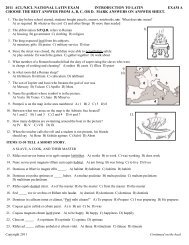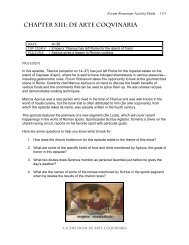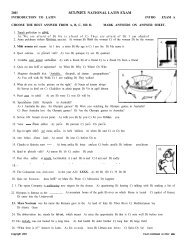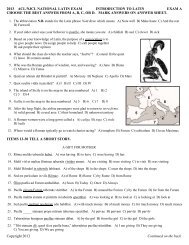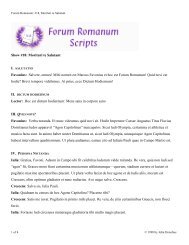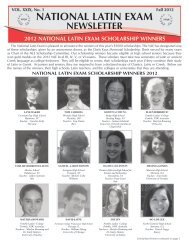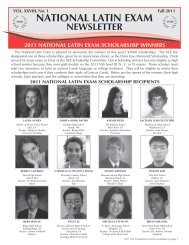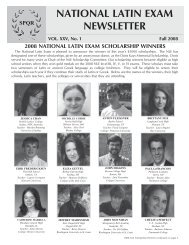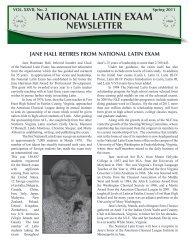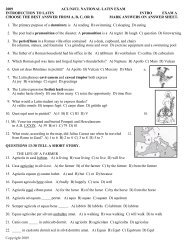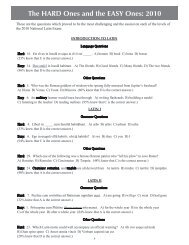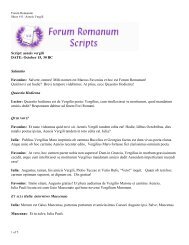2008 NLE Newsletter - The National Latin Exam
2008 NLE Newsletter - The National Latin Exam
2008 NLE Newsletter - The National Latin Exam
You also want an ePaper? Increase the reach of your titles
YUMPU automatically turns print PDFs into web optimized ePapers that Google loves.
SPQR<br />
NATIONAL LATIN EXAM<br />
NEWSLETTER<br />
VOL. XXIV, No.2 Spring <strong>2008</strong><br />
ACL/NJCL NATIONAL LATIN EXAM REPORT <strong>2008</strong><br />
In <strong>2008</strong>, more than 150,000 students applied to take the thirty-first <strong>National</strong> <strong>Latin</strong> <strong>Exam</strong>.<br />
Participation in the <strong>Exam</strong> has increased each year since its inception in 1977, when approximately 6,000<br />
students enrolled. Students from all fifty states participated this year, as did students from eleven<br />
foreign countries, including Australia, Bulgaria, Canada, China, Italy, Mozambique, New Zealand,<br />
Poland, United Kingdom and Zimbabwe. This year for the first time, students from Brazil also took<br />
the <strong>NLE</strong>.<br />
During the second week in March, over 135,000 students took the <strong>National</strong> <strong>Latin</strong> <strong>Exam</strong> in<br />
their own schools, and it was administered in 16 colleges and 15 elementary schools. Also participating<br />
were 272 home schools. <strong>The</strong> breakdown of awards for each exam (the number correct out of forty) is<br />
shown below, above each category.<br />
continued on page 2<br />
✴ New ✴<br />
<strong>Latin</strong> III<br />
<strong>Exam</strong> for<br />
2009<br />
details on pg 3<br />
LEVEL TOTAL PERFECT GOLD SILVER MAGNA CUM TOTAL<br />
TOTAL AWARDS<br />
Intro 16,923 356 4,969 ribbons, Cert.of Outst. Achievement for 34-40<br />
2,844 Cert. of Achievement for 31-33 7,813<br />
<strong>Latin</strong> I 36-40 33-35 31-32 29-30<br />
51,492 604 6,311 6,556 5,134 5,858 23,859<br />
<strong>Latin</strong> II 36-40 32-35 30-31 28-29<br />
33,628 279 3,714 5,638 3,269 3,377 15,998<br />
Prose III 35-40 32-34 30-31 28-29<br />
17,298 94 2,044 2,343 1,869 1,971 8,227<br />
Poetry III 30-40 27-29 25-26 24<br />
3,108 6 500 423 346 188 1,457<br />
Prose IV 36-40 33-35 31-32 30<br />
2,915 19 357 439 365 187 1,348<br />
Poetry IV 34-40 31-33 29-30 27-28<br />
7,256 25 956 966 737 857 3,576<br />
<strong>Latin</strong> V 36-40 34-35 32-33 30-31<br />
2,431 26 361 195 231 239 1,026<br />
<strong>Latin</strong> VI 37-40 35-36 33-34 30-32<br />
311 9 59 43 28 43 173<br />
Totals 135,362 1,418 14,302 16,603 12,039 12,720 55,664
<strong>Exam</strong> Report <strong>2008</strong><br />
continued from page 1<br />
<strong>The</strong>re were 1,062 perfect papers in <strong>Latin</strong> I-VI. A<br />
congratulatory letter has been sent to the principal of each<br />
school with copies for the student, the <strong>Latin</strong> teacher, and the<br />
student's permanent record. In addition, a special hand-lettered<br />
certificate was sent to each of these students.<br />
<strong>The</strong> 5 students who have three years of perfect papers<br />
and the 1 student who has four years of perfect papers are being<br />
sent the Carter Stubbs Drake Goad Memorial book award in<br />
addition to the special certificate.<br />
In the Introduction to <strong>Latin</strong> <strong>Exam</strong>, which was<br />
taken by 16,923 students, 7,813 students won awards. As<br />
the average number correct on this <strong>Exam</strong> was 30, students<br />
who scored 31-33 correct out of forty received Certificates<br />
of Achievement, and those with scores of 34-40 received<br />
Certificates of Outstanding Achievement and purple ribbons.<br />
<strong>The</strong> 356 students who answered all 40 questions correctly were<br />
sent a special congratulatory letter from the <strong>NLE</strong> Committee.<br />
<strong>The</strong>re were 1,204 seniors who won gold medals on<br />
the <strong>Latin</strong> III-IV Prose, III-IV Poetry, or the <strong>Latin</strong> V-VI <strong>Exam</strong>.<br />
<strong>The</strong>se students are eligible for one of the twenty-one $1000<br />
scholarships, including one from an anonymous donor. In<br />
addition, a $2000 scholarship will be awarded for post graduate<br />
study leading to the teaching of <strong>Latin</strong> or Greek at the elementary,<br />
intermediate, or high school level. <strong>The</strong>se Scholarship awards<br />
and those for the <strong>National</strong> Greek <strong>Exam</strong> will be announced by<br />
<strong>NLE</strong> Scholarship Chair, Ephy Howard, at the ACL Institute<br />
at the University of New Hampshire in Durham, NH, in June.<br />
<strong>The</strong> <strong>National</strong> <strong>Latin</strong> <strong>Exam</strong> Scholarship Committee, formed in<br />
1983, consists of Ephy Howard, Chair, and members Conrad<br />
Barrett, Judith de Luce, Gaylan DuBose, Edith Foster, Sara<br />
T. Gibson, and Sue Gillen. Linda S. Montross serves as the<br />
Scholarship Liaison. <strong>The</strong> scholarship recipients from 2007,<br />
2006, and 2005, are eligible for an additional $1000 if they<br />
continue their study of <strong>Latin</strong> or Greek. In 2007, the <strong>National</strong><br />
<strong>Latin</strong> <strong>Exam</strong> awarded $47,500 in scholarships.<br />
<strong>The</strong> Maureen O'Donnell Oxford Classical Dictionary<br />
Award, given to students who win four gold medals, is being<br />
sent to 537 students this year in recognition of their outstanding<br />
achievement. <strong>The</strong> 77 students who have won five gold medals<br />
will be sent special book awards.<br />
In September, the <strong>National</strong> <strong>Latin</strong> <strong>Exam</strong> office sent the<br />
application for the <strong>2008</strong> <strong>National</strong> <strong>Latin</strong> <strong>Exam</strong> to teachers who<br />
participated in the 2007 <strong>NLE</strong>. Upon receipt of the application<br />
and payment, a postcard was sent from the <strong>NLE</strong> office to the<br />
teacher, verifying the number of applicants and informing the<br />
teacher that the exams and answer sheets would be mailed to<br />
the <strong>Exam</strong> administrator or principal by February 20, <strong>2008</strong>, by<br />
the United Parcel Service.<br />
Clement Testing Service mailed out the exams,<br />
answer sheets and instructions and scored the returned answer<br />
sheets. <strong>The</strong> company mailed out the results, awards, exam<br />
answers, and a congratulatory letter to the teacher by April<br />
20, <strong>2008</strong>. A copy of the congratulatory letter for the principal<br />
was included in this package. <strong>The</strong> national percent correct for<br />
each question was also included as well as the percent correct<br />
2<br />
on each question for the individual school. Both percentages<br />
were provided in order to help teachers and students assess<br />
strengths and weaknesses.<br />
<strong>The</strong> <strong>2008</strong> PERFECT PAPER and GOLD MEDAL<br />
winners will be published in Torch U.S., the publication of the<br />
<strong>National</strong> Junior Classical League.<br />
<strong>The</strong> chart given below indicates the states with<br />
the greatest number of students taking the <strong>2008</strong> exam and<br />
those showing the greatest increase in percentage of those<br />
participating.<br />
<strong>The</strong> states with the greatest<br />
number of students taking the<br />
<strong>2008</strong> <strong>Exam</strong>s:<br />
<strong>The</strong> states with<br />
the greatest % increase in<br />
number of students<br />
taking the <strong>2008</strong> <strong>Exam</strong>s:<br />
continued on page 10<br />
Massachusetts 12,214<br />
New York 10,913<br />
Virginia 10,729<br />
Pennsylvania 9,090<br />
Texas 8,803<br />
New Jersey 8,753<br />
Ohio 7,378<br />
California 7,347<br />
Connecticut 6,065<br />
Georgia 5,526<br />
New Mexico 182%<br />
South Dakota 36%<br />
Nevada 32%<br />
Alaska 13%<br />
Missouri 13%<br />
North Dakota 12%<br />
West Virginia 12%<br />
Vermont 9%<br />
Arizona 8%<br />
Michigan 8%
✴ ✴ ✴ NEW LATIN III EXAM AVAILABLE FOR 2009 ✴ ✴ ✴<br />
<strong>The</strong> <strong>NLE</strong> is offering a brand new exam! Beginning in 2009, teachers of level three students<br />
will be able to choose between <strong>Latin</strong> III-IV Prose, <strong>Latin</strong> III-IV Poetry, and a generic <strong>Latin</strong> III exam.<br />
Because of the many requests and suggestions offered by teachers who do not complete the<br />
study of <strong>Latin</strong> grammar and syntax in two years, the <strong>NLE</strong> Writing/Steering Committee would like<br />
to introduce a separate exam to serve students who are in those programs. Many teachers also<br />
stated that their third year students were not prepared for the literary questions on the Prose or<br />
Poetry exams.<br />
After the Committee reviewed the responses to our survey announced in the Fall<br />
<strong>Newsletter</strong>, they found overwhelming support for this new exam. <strong>The</strong> emergence of new textbooks<br />
and teaching philosophies has brought changes to the traditional <strong>Latin</strong> curriculum. Many programs<br />
across the country complete the second year textbook in the third year of <strong>Latin</strong> and then make the<br />
transition to authentic <strong>Latin</strong> literature by reading artificial or adapted passages and stories. <strong>The</strong>re<br />
are many schools that do not expose their students to authentic <strong>Latin</strong> literature until late in the<br />
third year or the beginning of the fourth. Furthermore, the study of <strong>Latin</strong> prose, traditionally Caesar,<br />
Cicero, and Pliny, continues to decline in favor of the Roman lyric and epic poets.<br />
<strong>The</strong> proposed syllabus for the <strong>Latin</strong> III exam will contain items typically encountered at the<br />
end of the second year textbook and will strive to represent the middle ground between the <strong>Latin</strong><br />
II exam and the <strong>Latin</strong> III-IV Prose exam. Language items will focus on, but are not limited to, the<br />
uses of the subjunctive mood, indirect statement, the uses of gerunds, and gerundives, and case<br />
uses determined by special verbs and adjectives. In keeping with the format of the <strong>Latin</strong> I and II<br />
exams, there will be questions on the geography of the Roman world, the history of the Roman<br />
Republic and Early Empire, the myths of Greek and Roman heroes and typical Roman and Italian<br />
deities, and ceremonies in which Romans participated throughout their lives. Please see the entire<br />
proposed syllabus for the <strong>Latin</strong> III exam on pages 4 and 5.<br />
<strong>The</strong> new <strong>Latin</strong> III exam does not replace the <strong>Latin</strong> III-IV Prose exam; the syllabus for that<br />
exam will not change for 2009. Future changes may be necessary after the committee reviews<br />
the impact and effectiveness of the <strong>Latin</strong> III exam. <strong>The</strong> committee looks forward to hearing from<br />
teachers who give this new exam as we strive to offer a meaningful and rewarding experience for<br />
all <strong>Latin</strong> students.<br />
<strong>The</strong> committee asks that teachers, after studying the proposed new syllabus for this exam,<br />
send any concerns and suggestions to: <strong>National</strong> <strong>Latin</strong> <strong>Exam</strong>, New <strong>Latin</strong> III Proposed Syllabus,<br />
University of Mary Washington, 1301 College Avenue, Fredericksburg, Virginia 22401, or email us<br />
at <strong>NLE</strong>@umw.edu. <strong>The</strong>se suggestions need to be sent to the <strong>NLE</strong> office by August 1 if they are to<br />
have an effect on the 2009 exam.<br />
3<br />
<strong>Latin</strong> III <strong>Exam</strong> Syllabus on page 4
<strong>National</strong> <strong>Latin</strong> <strong>Exam</strong> Proposed Syllabus<br />
LATIN III EXAM<br />
I. LANGUAGE (in addition to items in <strong>Latin</strong> I and II)<br />
NOUNS:<br />
Nominative:<br />
Genitive:<br />
predicate nominative with passive verbs,<br />
e.g., appello, fio, nomino<br />
partitive<br />
with causa or gratia<br />
LATIN III<br />
READING LEVEL<br />
Students read and understand<br />
passages heavily adapted and<br />
simplified from the original<br />
description<br />
authors. <strong>The</strong>y interpret the<br />
objective<br />
meaning of the passage based<br />
Dative: possession<br />
on their knowledge of Roman<br />
purpose and reference (double dative)<br />
agent<br />
culture.<br />
Accusative:<br />
with special adjectives, e.g., amicus, carus, similis<br />
with special verbs, e.g., impero, pareo, placeo<br />
with compound verbs, e.g., occurro, praeficio<br />
place to which (without prepositions)<br />
object of prepositions, e.g., apud, praeter, super<br />
exclamation<br />
Ablative: place from which (without prepositions)<br />
comparison<br />
description<br />
separation<br />
cause<br />
with special verbs, e.g., utor, potior, vescor<br />
Locative: place where, e.g., names of cities, towns, small islands, domus, rus<br />
PRONOUNS:<br />
ADJECTIVES:<br />
ADVERBS:<br />
ipse, idem<br />
indefinite, e.g., aliquis, quidam, quisque<br />
irregular, e.g., alius, alter, solus<br />
positive, comparative, and superlative of special adjectives, e.g., bonus, facilis,<br />
liber, idoneus<br />
positive, comparative, and superlative of special adverbs, e.g., bene, diu,<br />
magnopere<br />
CONJUNCTIONS:<br />
si, antequam, postquam, nam, vero<br />
correlatives, e.g., sive...sive, vel...vel<br />
ENCLITICS:<br />
-ne, -que, -ve, -cum<br />
4
VERBS:<br />
deponent<br />
irregular, e.g., fio, malo, volo<br />
impersonal, e.g., oportet<br />
irregular imperatives, e.g., dic, duc, fac, fer<br />
indirect statement with past tense main verbs<br />
subjunctive mood<br />
hortatory, jussive<br />
indirect command<br />
indirect question<br />
clauses of fearing<br />
purpose clauses<br />
result clauses<br />
cum clauses<br />
conditionals<br />
SYNTAX:<br />
ablative absolute<br />
active and passive periphrastic<br />
gerunds and gerundives<br />
expressions of purpose with gerunds and gerundives<br />
idioms, e.g., vita excedere, navem solvere<br />
II. CULTURE AND CIVILIZATION (in addition to items in <strong>Latin</strong> I and II)<br />
GEOGRAPHY: Notable cities, regions, mountains, rivers, and bodies of water of Italy and<br />
the ancient world, e.g., Naples, Gallia, Pyrenees, Rubicon, Nile, Aegean Sea<br />
HISTORY: Prominent persons and events from the Roman Republic and Early Empire,<br />
e.g., Julius Caesar, Marius, Sulla, Nero, War with Pyrrhus, Battle of Actium<br />
MYTHOLOGY:<br />
Greek and Roman heroes, e.g., Perseus, Jason, Mucius Scaevola<br />
typical Roman and Italian deities, e.g., Janus, Vesta<br />
origins and changes, e.g., Daphne, Baucis and Philemon, Niobe<br />
ROMAN LIFE:<br />
calendar terms, e.g., Kalends, Nones, Ides, pr. (pridie), a.d. (ante diem)<br />
religion, e.g., pontifex maximus, augures<br />
ceremonies, e.g., weddings, funerals<br />
III. LATIN IN USE (in addition to items in <strong>Latin</strong> I and II)<br />
BASIC SPOKEN PHRASES: e.g., Quid agis?, plaudite omnes, me paenitet, eamus<br />
DERIVATIVES: English words based on <strong>Latin</strong> roots, prefixes, and suffixes, e.g., agenda,<br />
conspicuous, moratorium<br />
EXPRESSIONS, MOTTOES, ABBREVIATIONS: e.g., Pyrrhic victory, crossing the<br />
Rubicon, non sequitur, ad hominem, Q.E.D.<br />
5
BLOCK SCHEDULING ANALYSIS<br />
FOR <strong>2008</strong> NATIONAL LATIN EXAM<br />
Again on the <strong>2008</strong> <strong>NLE</strong> application, teachers were asked to indicate if they taught on a semester-block<br />
(4 by 4) schedule. Of the students taking the exam, 7,628 in 230 schools were taught on this type schedule.<br />
<strong>The</strong>se students’ test scores were examined and compared with the mean scores of students on traditional<br />
schedules. <strong>The</strong> results are below:<br />
Block + Non Block Non Block Block<br />
Number of Mean Number of Mean Number of Mean<br />
Students Score Students Score Students Score<br />
INTRO 16,923 30 15,841 30 1,082 28<br />
LAT 1 51,492 28 48,775 28 2,717 28<br />
LAT 2 33,628 28 31,540 28 2,088 26<br />
PROS 3 17,298 27 16,425 27 873 26<br />
PTRY 3 3,108 23 2,939 23 169 23<br />
PROS 4 2,915 24 2,771 24 144 23<br />
PTRY 4 7,256 26 6,934 26 322 26<br />
LAT 5 2,431 28 2,293 28 138 27<br />
LAT 6 311 29 294 29 17 29<br />
TOTALS 135,362 27 127,734 27 7,628 27<br />
<strong>NLE</strong> OFFICE STAFF<br />
Janine Kuty, Office Manager<br />
Rose McCreary, Clerical/Data Entry Specialist<br />
Ellen Smith, Administrative Assistant<br />
Liz Scott, Clerical<br />
Carol Kuty, Seasonal Clerical Help<br />
6
ANALYSIS OF THE <strong>2008</strong> <strong>NLE</strong> SCORES OF<br />
HOME SCHOOLED STUDENTS<br />
According to the <strong>2008</strong> <strong>NLE</strong> applications, 1,135 students taking the exam were taught in 272 home schools. <strong>The</strong>se<br />
students’ test scores were examined and compared with the mean scores of students in traditional schools. <strong>The</strong> results<br />
are below.<br />
Home Sch + Traditional Traditional Home School<br />
Number of Mean Number of Mean Number of Mean<br />
Students Score Students Score Students Score<br />
INTRO 16,923 30 16,583 30 430 31<br />
LAT 1 51,492 28 51,082 28 410 30<br />
LAT 2 33,628 28 33,368 28 260 29<br />
PROS 3 17,298 27 17,230 27 68 32<br />
PROS 3 3,108 23 3,098 23 10 30<br />
PTRY 4 2,915 24 2,905 24 10 29<br />
PTRY 4 7,256 26 7,239 26 17 34<br />
LAT 5 2,431 28 2,418 28 13 32<br />
LAT 6 311 29 309 28 2 36<br />
TOTALS 135,362 27 134,227 27 1,135 30<br />
A TEACHER’S THANKS<br />
Dear <strong>NLE</strong>,<br />
I just wanted to say thank you for sponsoring this exam. I teach in a low income school, and I cannot tell you<br />
how much I appreciate the opportunity to offer my students some academic competition on the national level such as<br />
this. Our students have very low expectations, so when I pass out the medals and certificates from the <strong>NLE</strong>, it really means<br />
something to them, and it opens their eyes to the possibilities in life.<br />
Also, I am in love with the <strong>NLE</strong> medals! Thank you, thank you, thank you to whoever designed them. <strong>The</strong>y really<br />
bring home the fact that the ancient world is still applicable to us when the students see the SPQR and the fasces – they<br />
aren’t just dead objects from the distant past, but alive and recognizable in our own lives today. Gratias tibi ago!<br />
Sincerely,<br />
Melony Carey<br />
Muskogee High School<br />
Muskogee, Oklahoma<br />
?? 7
<strong>The</strong> HARD Ones and the EASY Ones: <strong>2008</strong><br />
<strong>The</strong>se are the questions which proved to be<br />
the most challenging and the easiest on each of the levels of the <strong>2008</strong> <strong>National</strong> <strong>Latin</strong> <strong>Exam</strong>:<br />
INTRODUCTION TO LATIN<br />
Language Questions<br />
Hard: 29. Parvus gladiätor ante oculos magnï virï stat. A) the big man B) by the big man C) of the big<br />
man D) from the big man<br />
(36% knew that C was the correct answer.)<br />
Easy: 18. Parvus gladiätor nön respondet. A) replies quickly B) does not reply C) barely replies<br />
D) replies softly<br />
(98% knew that B is the correct answer.)<br />
Other Questions<br />
Hard: 7. <strong>The</strong> best translation of tempus fugit is A) seize the day B) time flies C) make haste slowly<br />
D) the time is right<br />
(67% knew that B is the correct answer.)<br />
Easy: 3. <strong>The</strong> individual who had complete control over a Roman family was the<br />
A) libertus B) pater C) servus D) filius<br />
(93% knew that B is the correct answer.)<br />
LATIN I<br />
Grammar Questions<br />
Hard: 11. Poëta _____ multäs fäbuläs närrävit. A) cïvës B) cïve C) cïvem D) cïvibus<br />
(28% knew that D is the correct answer.)<br />
Easy: 6. Nauta ad portum veniëbat quod nävem vidëre cupiëbat. A) because B) but C) whenever D) or<br />
(90% knew that A is the correct answer.)<br />
Other Questions<br />
Hard: 24. <strong>The</strong> last king of Rome, driven out of the city by L. Junius Brutus in 510 B.C., was<br />
A) Cincinnatus B) Hannibal C) Tarquinius Superbus D) Horatius Cocles<br />
(58% knew that C is the correct answer.)<br />
Easy: 20. If someone asks “Quid tibi nōmen est?” you should give your A) age B) weight C) country<br />
D) name<br />
(95% knew that D is the correct answer.)<br />
LATIN II<br />
Grammar Questions<br />
Hard: 17. Quandö eörum parentës pervënërunt? A) How B) Why C) How many D) When<br />
(27% knew that D is the correct answer.)<br />
Easy: 4. Puerï in agrïs trës höräs labörävërunt. A) in three hours B) after three hours C) for three hours<br />
D) about three hours<br />
(88% knew that C is the correct answer.)<br />
?? 8
Other Questions<br />
Hard: 28. Scipio Africanus the Elder is best remembered for A) writing De Bello Gallico B) expelling<br />
the last king of Rome C) revising the calendar D) defeating Hannibal<br />
(53% knew that D is the correct answer.)<br />
Easy: 25. <strong>The</strong> tour leader called the group’s attention to the abbreviation S.P.Q.R. which symbolized<br />
Roman A) mythology B) education C) government D) slavery<br />
(81% knew that C is the correct answer.)<br />
PROSE III AND IV<br />
Grammar Questions<br />
Hard: 11. Lücius hospitibus porcum pullumve in trïclïniö dabit. A) pork and chicken B) pork but not<br />
chicken C) pork or chicken D) pork with chicken<br />
(48% knew that C is the correct answer.)<br />
Easy: 8. Nön modo discipulï sed etiam magistrï discere possunt. A) Neither … nor B) Both … and<br />
C) Some … others D) Not only … but also<br />
(97% knew that D is the correct answer.)<br />
Other Questions<br />
Hard: 21. Where in Italy are Herculaneum, Pompeii, and Mount Vesuvius located? A) Etrüria<br />
B) Latium C) Campänia D) Sicilia<br />
(27% knew that C is the correct answer.)<br />
Easy: 26. What Roman orator wrote speeches against Verres and Catiline? A) Marc Antony B) Caesar<br />
C) Cicero D) Pompey<br />
(89% knew that C is the correct answer.)<br />
POETRY III AND IV<br />
Grammar Questions<br />
Hard: 9. Hï versüs mihi memoriä tenendï sunt. A) of me B) by me C) me D) with me<br />
(34% knew that B is the correct answer.)<br />
Easy: 14. Iuppiter et Mercurius nüntiävërunt së esse deös immortälës A) he B) she C) it D) they<br />
(83% knew that D is the correct answer.)<br />
Other Questions<br />
Hard: 25. On his way to deliver a message from Jupiter to Aeneas, Mercury stopped on the Atlas<br />
Mountains which are located A) in northern Africa B) between Spain and Gaul C) in<br />
southern Greece D) in central Europe<br />
(32% knew that A is the correct answer.)<br />
Easy: 20. Apollo’s priestesses at Delphi, at Cumae, and elsewhere were called A) nymphs B) maenads<br />
C) furies D) sibyls<br />
(95% knew that D is the correct answer.)<br />
?? 9
<strong>Exam</strong> Report <strong>2008</strong><br />
continued from page 2<br />
<strong>The</strong> members of the <strong>NLE</strong> Advisory Committee are<br />
David Volk, Chair (ND), Michael Bales (Canada), Nancy<br />
Czupik (OH), Debra Heaton (MA), Liane Houghtalin (VA),<br />
Joan Jahnige (KY), Susan McDonald (FL), Stephen Lee<br />
Pearce (LA), Tom Sienkewicz (IL), James Updegraff (CA),<br />
and Sandra Woodward (UT). <strong>The</strong>y are meeting at the <strong>2008</strong><br />
ACL Institute to review and discuss the <strong>2008</strong> exam. <strong>The</strong><br />
members of this Committee represent the various geographic<br />
areas of the country, middle and high schools, colleges, and<br />
public and private schools.<br />
<strong>The</strong> <strong>National</strong> Association of Secondary School<br />
Principals has voted to place the <strong>National</strong> <strong>Latin</strong> <strong>Exam</strong> on<br />
the on the Advisory List of <strong>National</strong> Contests and Activities<br />
for <strong>2008</strong>-2009. This list will be distributed to all secondary<br />
schools 3in the United States in September of <strong>2008</strong>.<br />
<strong>The</strong> <strong>2008</strong> exam was similar in format to the 2007 exam.<br />
For the Introduction to <strong>Latin</strong>, <strong>Latin</strong> I, II, III/IV Prose, and III/<br />
IV Poetry exams, there were 40 multiple-choice questions on<br />
grammar, comprehension, mythology, derivatives, literature,<br />
Roman life, and history. <strong>The</strong> <strong>Latin</strong> V-VI exam contained two<br />
<strong>Latin</strong> passages as the basis for 40 multiple-choice questions<br />
on grammar, comprehension, historical background, classical<br />
literature, and literary devices. <strong>The</strong> time limit for the exams<br />
was 45 minutes.<br />
<strong>The</strong> Writing Committee consists of Jane H. Hall<br />
(Co-Chair), Mark Keith (Co-Chair), Joe Davenport, Sally<br />
Davis, Elizabeth Heimbach, Ian Hochberg, Betty Merrill<br />
(<strong>Newsletter</strong>), Linda Montross, Christine Sleeper (Liaison),<br />
and David Winn. <strong>The</strong>y began writing the exams in the spring<br />
of 2007. By the middle of August all began the difficult task<br />
of reviewing each exam with respect to the level of difficulty,<br />
accuracy, and content. After several revisions, the exams<br />
were sent to consultants Michael Bales, Sheila Dickison, John<br />
Donohue, Kathy Elifrits, Kevin Gushman, Ruth Haukeland,<br />
Edith Kovach, David Perry, and Wallace Ragan, for their indepth<br />
critiques. Acting upon their suggestions, the Committee<br />
made further revisions. After a final reading and revision,<br />
173,000 copies of the exams were printed.<br />
<strong>The</strong> <strong>2008</strong> exam required eleven sessions averaging two<br />
hours each to complete the work associated with the exams.<br />
In addition to the general working sessions, each Committee<br />
member spent countless hours taking care of specific tasks<br />
such as writing exam questions, answering correspondence,<br />
word processing, record keeping, publicizing the exam,<br />
ordering supplies, and writing newsletter articles. <strong>The</strong> <strong>NLE</strong><br />
Office Manager Janine Kuty, Administrative Assistant Ellen<br />
Smith, Data Entry Specialist Rose McCreary, and student aide<br />
Liz Scott tended to numerous <strong>NLE</strong> matters such as registering<br />
schools for the exam, processing exam fees, answering daily<br />
phone calls and e-mails, handling bookkeeping, and mailing<br />
newsletters, postcards, Awards Letters, and Perfect Paper<br />
Certificates.<br />
<strong>The</strong> tip sheet which was sent out with the application<br />
continues to have a very positive effect. Many more applications<br />
10<br />
??<br />
came in December, and there were not as many frantic calls<br />
about needing more exams and/or answer sheets.<br />
Copies of the four previous exams and the <strong>National</strong><br />
<strong>Latin</strong> <strong>Exam</strong> Syllabus are available for purchase from the<br />
American Classical League office in Oxford, Ohio for $9.00,<br />
or online at the <strong>NLE</strong> Web Site www.nle.org<br />
<strong>The</strong> <strong>NLE</strong> again asked teachers to indicate on the <strong>2008</strong><br />
application if their schools were on semester block schedule.<br />
We published the findings last year in the Fall <strong>Newsletter</strong> and<br />
hope to expand those results this year. <strong>The</strong> findings are in this<br />
Spring <strong>Newsletter</strong>.<br />
<strong>The</strong> postmark deadline for the 2009 <strong>NLE</strong> application<br />
is January 16, 2009. <strong>The</strong> price for the 2009 exams is $4.00<br />
per exam, $6.00 foreign, $10.00 minimum order, plus a $10<br />
charge for postage and handling.<br />
<strong>The</strong> philosophy of the <strong>National</strong> <strong>Latin</strong> <strong>Exam</strong> is<br />
predicated on providing all <strong>Latin</strong> students the opportunity to<br />
experience a sense of personal accomplishment and success in<br />
their study of the <strong>Latin</strong> language and culture. This opportunity<br />
exists for individual students since, in the <strong>National</strong> <strong>Latin</strong><br />
<strong>Exam</strong>, they are not competing with their fellow students on<br />
a comparative basis, but are evaluated solely on their own<br />
performance on the exam. <strong>The</strong> basic purposes of the <strong>NLE</strong> are<br />
to promote the study of <strong>Latin</strong> and to encourage the individual<br />
student.<br />
<strong>The</strong> <strong>NLE</strong>-sponsored <strong>Latin</strong> news program, entitled<br />
FORUM ROMANUM, twenty-four ten-minute programs<br />
presented entirely in <strong>Latin</strong> by qualified <strong>Latin</strong> language speakers,<br />
continues to receive enthusiastic reviews from <strong>Latin</strong> teachers<br />
across the nation. FORUM ROMANUM is available on DVD<br />
and Video from the American Classical League Teaching<br />
Materials & Resource Center. John Donohue, author of the<br />
series, has written an activity book to accompany FORUM<br />
ROMANUM which is also available from the ACL/TMRC in<br />
Oxford, OH.<br />
<strong>The</strong> <strong>NLE</strong> web site, which is maintained by Cindy<br />
Caltagirone, contains the <strong>2008</strong> exams, the syllabus, and the<br />
newsletters. Members of the various committees connected<br />
with the <strong>NLE</strong> and FORUM ROMANUM scripts are posted<br />
on the site. <strong>The</strong> address for the web site is www.nle.org.<br />
<strong>The</strong> <strong>National</strong> <strong>Latin</strong> <strong>Exam</strong> is located at the University<br />
of Mary Washington, 1301 College Ave, Fredericksburg,<br />
VA 22401; Tel 1-888-378-7721; email: nle@umw.edu <strong>The</strong><br />
Committee wishes to extend a special thank-you to all the<br />
hardworking <strong>Latin</strong> teachers and their students who have helped<br />
to make the <strong>National</strong> <strong>Latin</strong> <strong>Exam</strong> a success.
DEAR NELLY<br />
<strong>National</strong> <strong>Latin</strong> <strong>Exam</strong><br />
University of Mary Washington<br />
1301 College Avenue<br />
Fredericksburg, Virginia 22401<br />
Dear Nelly,<br />
I did everything right and yet was still thrown into that last minute panic! I collected money<br />
from my students early in December, filled out the application, and turned everything over to our<br />
financial secretary well before our Christmas break so that she could send the purchase order. I<br />
enjoyed that holiday thinking that I had done all the requirements for my students to take the <strong>NLE</strong>.<br />
When, after the break, I did not receive the <strong>NLE</strong> postcard, I began to worry. A call to your office<br />
confirmed my fear: You received the purchase order but not my application. <strong>The</strong> application was<br />
still in the stack on the financial secretary’s desk and the deadline was looming. While I eventually did get everything in on time,<br />
that last-minute scramble was no fun. What can be done to avoid this sort of situation next year? Shouldn’t you have followed up by<br />
informing me of the situation?<br />
Scrambling in Scranton<br />
Dear Scrambling,<br />
Purchase orders are not acceptable in lieu of application and payment. In order to register your school, we must receive your<br />
application and check or money order. When our office receives a purchase order, we send an invoice to the originator of the purchase<br />
order. Once we have invoiced the originator of the purchase order, it becomes your responsibility to follow up with the originator, to<br />
submit an application to them, and to make sure that the application and payment are mailed to our office on or before the postmark<br />
deadline. You did the right thing, but perhaps you will have to start even earlier next year.<br />
Dear Nelly,<br />
My students always ask me if guessing at exam answers is a good idea. Are they penalized more for answering a question<br />
incorrectly than they would be if the left the answer blank?<br />
Just Wondering in Wooster<br />
Dear Just Wondering,<br />
It is best for your students to go ahead and try a guess. Answers are either right or wrong. <strong>The</strong>re is no partial credit for attempting<br />
to answer a question and answering incorrectly. No credit is given for either wrong answers or non-answers. Only correct answers<br />
receive credit and count toward the student’s total number of correct answers out of 40.<br />
Dear Nelly,<br />
I am a new teacher in a school that has never offered <strong>Latin</strong> before. How do I get on your mailing list so that I can receive an<br />
application for the <strong>NLE</strong>? Thank goodness this year for a friend in a neighboring school who passed on an application to me allowing<br />
my students to participate in the <strong>National</strong> <strong>Latin</strong> <strong>Exam</strong>.<br />
New Teacher in Newark<br />
Dear New Teacher,<br />
Our office mails applications to all teachers who have participated in the <strong>NLE</strong> for any of the past three years. We mail the<br />
application to schools in September. If you haven’t received your application by October, contact our office. Please do not wait until<br />
after the deadline to request an application. If you do so, your school will not be able to register for the exam. In addition to the<br />
application that is mailed to your school in September, the application is also available online beginning in August at www.nle.org ,<br />
and a copy of the application will be included in the Fall <strong>2008</strong> <strong>Newsletter</strong>.<br />
11<br />
continued on page 13
THE NATIONAL LATIN EXAM CONSULTANTS<br />
Every fall the Consultants critique the exams and offer suggestions for improvement to the<br />
Writing Committee. <strong>The</strong>ir ideas and contributions are invaluable in the process of preparing the<br />
exams for distribution to national and international <strong>Latin</strong> students.<br />
Martha Abbott Sheila K. Dickison<br />
mabbott@actfl.org Doctord@ufl.edu<br />
John Donohue Kathy Elifrits<br />
JohnJDonohue@msn.com kelifrits@netzero.net<br />
Kevin Gushman Ruth Haukeland<br />
kgushman@aol.com einaruth@aol.com<br />
Edith Kovach Wallace Ragan<br />
emak1@sbcglobal.net Wallace_ragan@cathedral.org<br />
David Perry Michael Bales<br />
hospes.primus@verizon.net mbales@tfs.ca<br />
NATIONAL LATIN EXAM WRITING/STEERING COMMITTEE<br />
<strong>The</strong>se are the committee members who meet throughout the year to discuss, write, finetune,<br />
and proof the exams. All seasoned <strong>Latin</strong> teachers, they have experience using a wide variety<br />
of text books and methods.<br />
Jane H. Hall, Co-Chair Mark Keith, Co-Chair<br />
jhhall@kaballero.com pallanteum@comcast.net<br />
Sally Davis Betty Merrill, <strong>Newsletter</strong><br />
saldavis@comcast.net bmerrill10@hotmail.com<br />
Linda Montross Christine Sleeper, Liaison to Consultants<br />
amovos@aol.com cffsleeper@aol.com<br />
David Winn Ian Hochberg<br />
auber82000@yahoo.com ihochberg@sssas.org<br />
Elizabeth Heimbach Joe Davenport<br />
EHeimbach@aol.com davenport@norwellschools.org<br />
12
DEAR NELLY cont.<br />
Dear Nelly,<br />
Is the test administrator supposed to return the unused answer sheets when she mails to you the ones the students have filled out while<br />
taking the exam? I never know what to tell her.<br />
Just Asking in Ashland<br />
Dear Just Asking,<br />
Other teachers/proctors have called to ask this same question. <strong>The</strong> answer is yes, the proctors should return both the used and<br />
unused answer sheets to the testing service.<br />
Ephy Howard, Chair<br />
epec@troycable.net<br />
Conrad Barrett<br />
RConradBarrett@aol.com<br />
Judith de Luce<br />
delucej@muohio.edu<br />
Gaylan DuBose<br />
Gaylan1004@yahoo.com<br />
CHECK OUT THE <strong>NLE</strong> WEBSITE!<br />
www.nle.org<br />
UP-TO-DATE INFORMATION ON:<br />
<strong>The</strong> <strong>2008</strong> <strong>Exam</strong>s and Answers<br />
Results, Awards, and Scholarship Information for <strong>2008</strong><br />
Our Application for 2009<br />
Special Instructions for Home-Schoolers<br />
Copies of the 1999-<strong>2008</strong> <strong>Exam</strong>s<br />
<strong>The</strong> Syllabus for Each Level<br />
Contact Information for the <strong>NLE</strong> Committees and Consultants<br />
FORUM ROMANUM Videos, DVD, and Scripts<br />
Links to ACL and Other Classical Organizations<br />
MEMBERS OF THE SCHOLARSHIP COMMITTEE<br />
13<br />
Edith Foster<br />
fostere@kenyon.edu<br />
Sara T. Gibson<br />
sbtgibson@aol.com<br />
Sue L. Gillen<br />
slgillen@comcast.net<br />
Linda Montross, Liason to the Scholars<br />
amovos@aol.com
THE <strong>NLE</strong> ADVISORY COMMITTEE<br />
<strong>The</strong> <strong>NLE</strong> Advisory Committee will meet in June <strong>2008</strong> during the ACL Institute at the University of New<br />
Hampshire in Durham. <strong>The</strong> members of this committee represent the various geographic areas of the country, from<br />
both public and private middle schools, high schools, and colleges. Please feel free to contact any of these members<br />
with your comments, suggestions, questions, or concerns about the <strong>National</strong> <strong>Latin</strong> <strong>Exam</strong>. Your concerns will be<br />
discussed at the meeting in June.<br />
Members of the <strong>NLE</strong> Advisory Committee - <strong>2008</strong><br />
David Volk, Chair<br />
1122 Oak Street North<br />
Fargo, ND 58102<br />
Phone: 701-237-4103<br />
E-Mail: volkd@fargo.k12.nd.us<br />
Debra M. Heaton Sandra Woodward<br />
80 School Street 2881 Sable Avenue<br />
Lexington, MA 02421 Salt Lake City, UT 84118<br />
Phone: 781-863-2670 Phone: 801-964-8252<br />
dheaton@comcast.net sandra.woodward@granite.k12.ut.us<br />
Joan Jahnige Michael Bales<br />
3521 Castlegate Wynd 470 Brunswick Avenue<br />
Lexington, KY 40502 Toronto, Ontario, Canada M5R 2Z5<br />
Phone: 859-268-8729 Phone: 416-484-6980 ext. 4221<br />
jjahnige@insightbb.com mbales@tfs.ca<br />
Susan McDonald Stephen Lee Pearce<br />
10054 Glenmore Avenue Dunelm Cottage<br />
Bradenton, FL 34202 830 Elysian Fields<br />
Phone: 941-355-6179 New Orleans, LA 70117-8514<br />
mcdonals@fc.manatee.k12.fl.us Phone: 504-286-2600<br />
STEPHEN_PEARCE@benfranklinhighschool.org<br />
Nancy M. Czupik James Updegraff<br />
27003 Wolf Road <strong>The</strong> Bishop's School<br />
Bay Village, OH 44140 7607 La Jolla Blvd.<br />
Phone: 440-892-8949 La Jolla, CA 92037<br />
nczupik@yahoo.com Phone: 858-459-4021, x295<br />
updegraj@bishops.com<br />
Liane Houghtalin Tom Sienkewicz<br />
Trinkle Hall 240 Classics Department<br />
University of Mary Washington Monmouth College<br />
Fredericksburg, VA 22401 Monmouth, IL 61462<br />
lhoughta@umw.edu toms@monm.edu<br />
14


